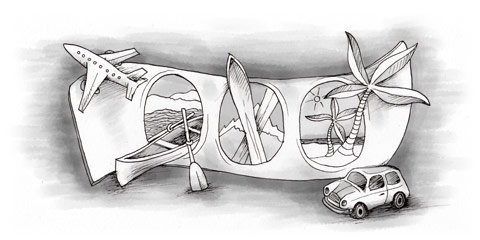One car in ten becomes a victim of ‘auto crime’ in England and Wales, and if you regularly park your car in a city street, you have a one in four chance of having it or its contents stolen. Having your car stolen means more than just taking a taxi home. It may mean weeks of delay sorting out insurance; extra time and expense travelling to work; possible loss of personal (maybe irreplaceable) possessions; and loss of your insurance no-claims discount. It may also involve hiring a solicitor or going to court to re-claim your car after it has been sold by the thief (if a car is stolen and sold, it can be a nightmare getting it back).
If you drive a new or valuable car, it’s wise to have it fitted with an alarm, an engine immobiliser (preferably of the rolling code variety with a transponder arming key) or other anti-theft device (such as a tracker) , and to use a visible deterrent such as a steering or gear lock. This is particularly important if you own a car that’s desirable to car thieves, which includes most new sports and executive cars, that are often stolen by professional crooks to order (although the most vulnerable cars are GTI hatchbacks which are often stolen and wrecked by joyriders – a British phenomenon). A reflection of the high rate of stolen cars is that it’s standard practice for many new cars to be fitted with dead locks and sophisticated alarm systems (some cars such as the Jaguar XJ are, according to experts, virtually theft-proof). Professional thieves now steal cars by towing them or removing them on trailers rather than cracking security devices. Needless to say, if you’re driving anything other than a worthless wreck, you should have theft insurance (which includes your stereo and belongings).
Don’t take unnecessary risks and always lock your car, engage your steering lock and completely close all windows (but don’t leave pets in an unventilated car). Never leave your keys in the ignition, not even in your driveway or when filling up at a petrol station. Put any valuables (including clothes) in the boot or out of sight and don’t leave your vehicle documents in the car or any form of identification. If possible, avoid parking in commuter and long-term car parks (e.g. at airports and railway stations), which are favourite hunting grounds for car thieves. When parking overnight or when it’s dark, park in a well-lit area, which helps deter car thieves.
Car theft has spawned a huge car security business in the (losing) battle to prevent or deter car thieves. Shops offer a multitude of car alarms, engine immobilisers, steering and gear stick locks, personal wheel clamps, systems for window etching with the car registration number, locking wheel nuts and petrol caps, and removable/coded stereo systems (a favourite target of thieves). A good security system won’t prevent someone breaking into your car (which usually takes a professional a matter of seconds) or prevent its being stolen. What it does do is to make it more difficult and may prompt a thief to look for an easier target. If you plan to buy an expensive stereo system, buy one with a removable unit or control panel/fascia (which you can pop in a pocket), but never forget to remove it, even when stopping for a few minutes (although thieves sometimes steal the back box, leaving you with a useless fascia). Finally, insure your car stereo for its full replacement value. If all else fails, buy a Reliant three-wheeler, as no self-respecting crook would touch it! For complete peace of mind, particularly in London, you’re better off using public transport.
The best (and most expensive) security for a valuable car is a tracking device, such as Securicor Trakbak and Tracker Network, that’s triggered by concealed motion detectors. The vehicle’s movements are tracked by radio or satellite and the police are automatically notified and recover over 90 per cent of vehicles. Some systems can immobilise a vehicle while it’s on the move (which might not be such a good idea!). Many insurance companies offer a discount on comprehensive insurance (e.g. 20 per cent) when you have a tracking system fitted.
A lot of information is available on car security, including How to Buy a Car and Keep it and Keep Your Car Secure published by the Home Office Crime Prevention Unit. If your car is stolen, report it to the police and your insurance company as soon as possible. Don’t, however, expect the police to find it or even take any interest in your loss. Further information about car crime prevention can be obtained from your local police station or from the Home Office Public Relations Branch, Room 157, 50 Queen Anne’s Gate, London SW1H 9AT.
This article is an extract from Living and working in Britain. Click here to get a copy now.


